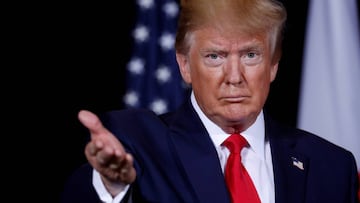Stimulus check: how much money did IRS send dead people?
A US government watchdog pointed to the Trump administration's poor response to the coronavirus pandemic, including the huge payment sent to deceased Americans.

A US government watchdog has pointed to the shortcomings in the Trump administration's response to the coronavirus pandemic. Highlights - or should that be 'lowlights'? - included the sending of nearly $1.4 billion to deceased Americans, and the collection of incomplete and inconsistent virus-testing data.
Millions of deceased issued support payment
The report issued by the Government Accountability Office marked the first review of the government's response to the coronavirus pandemic, and made recommendations to lawmakers how to improve the fight to come out of the crisis.
The watchdog noted amongst other shortfalls that the U.S. government had sent nearly $1.4 billion worth of stimulus checks to dead Americans as of the end of April, underlining challenges the government faces in ensuring funds are properly spent.
"The number of economic impact payments going to decedents highlights the importance of consistently using key safeguards in providing government assistance to individuals," the watchdog said.
Some of its harshest criticism was reserved for the Small Business Administration (SBA), which oversees a $670 billion emergency loan program to help companies survive the pandemic, and the lack of a plan from the Department of Transportation to improve the aviation sector's response to outbreaks.
Detailing its findings on the coronavirus testing data, the GAO said the data that was collected at times included antibody tests that detect prior infections, and sometimes included counts on the number of samples tested, which could include multiple tests for one person.
"The absence of complete and consistent Covid-19 testing data reported through May 31, 2020, has made it more difficult to track and know the infection rate, mitigate the effect of infections, and inform decisions on reopening communities," the watchdog said.
It said the United States is also missing a national aviation-preparedness plan for infectious diseases.
"While the Department of Transportation agreed that a plan is needed, as of May 2020, no such plan had been developed," the watchdog said. It said the Transportation Department has maintained that other U.S. agencies should take the lead in planning for outbreaks.
As part of its recommendations to U.S. lawmakers, the watchdog said it is urging them to take legislative action to require the Transportation Department to work with others to develop a national plan.
It criticised the SBA for failing to give detailed descriptions of loans made in its data, and not outlining plans to review loans worth less than $2 million.
"We encountered the most difficulty trying to obtain information from the Small Business Administration (SBA)," said the watchdog,. "SBA to date has failed to provide information critical to our review."
The SBA did not respond to a request for comment.
Transparency criticism
The level of transparency around U.S. government spending to fight the pandemic has been a contentious issue between various watchdogs and government agencies.
According to the watchdog, the U.S. government has set aside $2.6 trillion worth of spending to fight the pandemic, but spending so far is unknown as all agencies are not required to report their expenditures until July 2020. Some U.S. lawmakers responded to the report on Thursday by calling for greater transparency over how stimulus funds are being spent.
Related stories
"GAO found that more than $1 trillion in taxpayer funds have already been obligated with little transparency into how that money is being spent," U.S. Representative Carolyn B. Maloney said in a statement.
"The American people deserve to know whether those funds are being misused."

